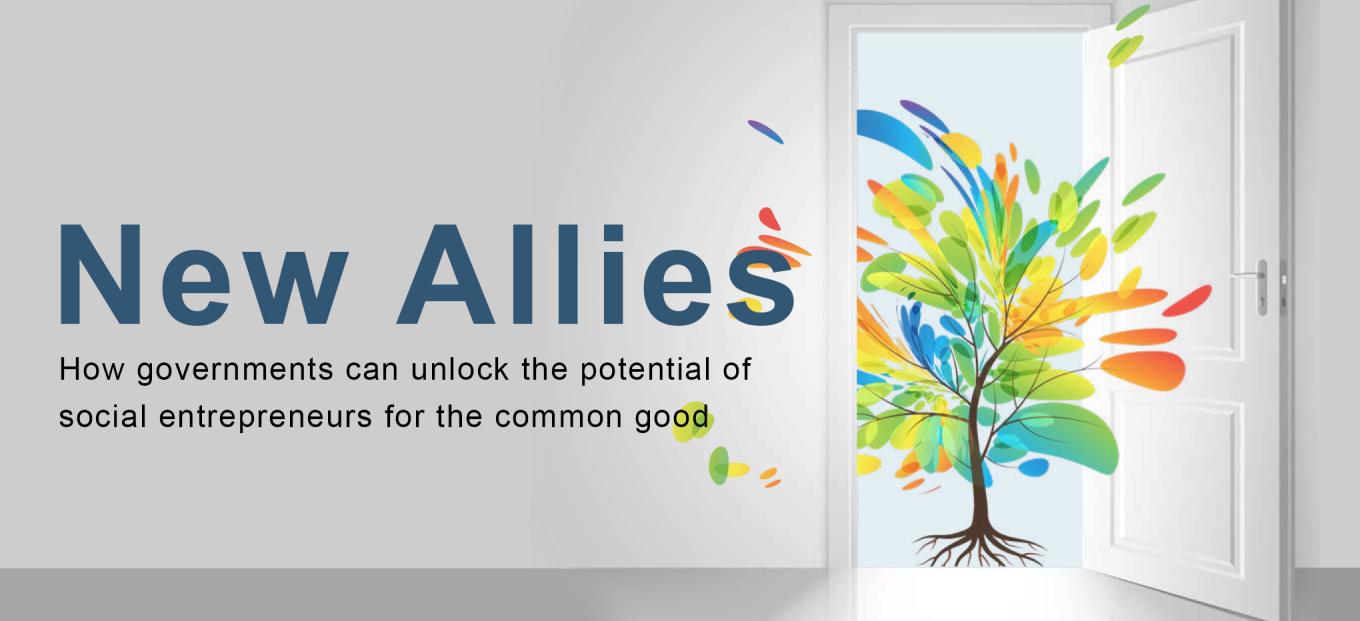
One year into the COVID-19 pandemic, the need to find, fund, and support transformative solutions for the challenges we are facing has only grown more urgent. This applies to all areas of society, including healthcare, education, the economy, and how governments interact with other sectors. Building on the joint effort in the ‘Embracing complexity’ report, published in January 2020, Ashoka and McKinsey have again joined forces with Catalyst 2030, an organization co-founded by Ashoka, Echoing Green, the Schwab Foundation for Social Entrepreneurship, the Skoll Foundation, and leading social entrepreneurs. This time, we reflect on the question: how can governments unlock the potential of social entrepreneurs as catalysts for structural change?
As a group of partners, we are united in the conviction that solving the most complex challenges faced by society today requires collaborative action across sectors. We further believe that government players can create the ecosystems that social entrepreneurs need to change policies, practices, power dynamics, social norms and mindsets. With this report, we aim to reach government players who want to enrich their current model of addressing societal challenges by including social entrepreneurs as catalysts for structural change.
The ideas we propose are not absolute truths; rather, they are the first steps in our collective journey to learn about more-effective collaborations between social entrepreneurs and governments. We invite governments – and the international organizations working with them – to fundamentally rethink and redesign the way innovative approaches developed by social entrepreneurs, and by civil society at large, are being supported. Our recommendations and examples focus on the national level, but the principles also apply to the local, regional and supranational levels.
Our work to better support systemic change approaches is still evolving, and we humbly ask you to join us on this journey. Together, we can create ecosystems in which transformative change can thrive so that society is better equipped to address the urgent challenges we face.
With multiple compounding crises to navigate simultaneously, governments across the world are facing the pressure to become faster and better at achieving societal goals. Delivering on goals such as access to quality healthcare and education, environmental sustainability or a balanced recovery from the pandemic will require changes to existing societal systems. This is because the underlying challenges are systemic in nature – and the required changes can be beneficial, not just from a societal but also an economic perspective.
Systems social entrepreneurs can be key allies for governments in bringing about these structural changes. Many social entrepreneurs take a systemic approach to solving societal issues – we call them ‘systems social entrepreneurs’ throughout this report. As society’s R&D lab, they work to change policies, practices, power dynamics, social norms or mindsets that currently hinder progress. They apply participative, people-centric ways of developing solutions to deliver innovative approaches, which can be a great complement to governments’ macro-level perspectives and can offer financial benefits for societies. For example, the financial benefit that systems social entrepreneurs could generate under the Ashoka umbrella in Germany alone has been estimated to be over EUR 18 billion (USD 21 billion) per year.1 Moreover, their presence in and trust-based relationships with vulnerable communities make them important partners in responding to the COVID-19 pandemic.
Governments are also in a unique position to enable change. They hold the key to changing many societal systems by institutionalizing successful innovations developed by systems social entrepreneurs to reach all their constituents, for example, by translating them into policies or adopting them in government programs. By evolving existing administrative practices, governments can create the supportive ecosystems that systems social entrepreneurs need to develop more of these innovative solutions. As transformation guides who can mobilize diverse coalitions around a shared vision, systems social entrepreneurs could even improve the legitimacy and accountability of policy processes.
Governments can act in five areas to create supportive ecosystems that unlock the potential of systems social entrepreneurs:
-
Leverage the power of information by sharing and co-creating data.
-
Build capabilities among civil servants and systems social entrepreneurs to enable mutual understanding and collaboration.
-
Develop funding models that recognize the characteristics of systems social entrepreneurs.
-
Promote collaboration between public sector organizations and between the public, private and social sectors.
-
Foster institutionalization by co-creating or adopting successful innovations.
For each of these areas, this report outlines concrete recommendations and provides real-life examples of changes that governments around the world have implemented. It builds on discussions with more than 50 government representatives and systems social entrepreneurs around the world. While our examples focus on national governments, they can also be applied to local and international levels. Coordinated efforts across all levels of government could further boost the impact of the actions proposed here.
⬇️ Read the report: